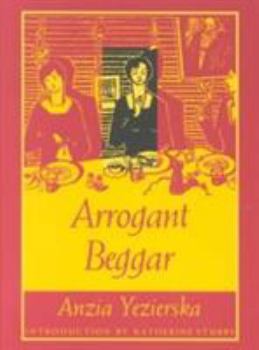Arrogant Beggar
Select Format
Select Condition 
Book Overview
The target of intense critical comment when it was first published in 1927, Arrogant Beggar's scathing attack on charity-run boardinghouses remains one of Anzia Yezierska's most devastating works of social criticism. The novel follows the fortunes of its young Jewish narrator, Adele Lindner, as she leaves the impoverished conditions of New York's Lower East Side and tries to rise in the world. Portraying Adele's experiences at the Hellman Home...
Format:Paperback
Language:English
ISBN:0822317494
ISBN13:9780822317494
Release Date:February 1996
Publisher:Duke University Press
Length:192 Pages
Weight:0.65 lbs.
Dimensions:0.6" x 6.0" x 8.3"
Customer Reviews
2 ratings
No Quiet on the Class Warfare Front
Published by Thriftbooks.com User , 15 years ago
Anzia Yezierska published her one great novel, Bread Givers, in 1925. It's a seemingly autobiographical account of the struggle for assimilation and for independence from a reactionary father of a Jewish immigrant girl in New York City, and it's quite a piece of work, innovative, fiery, and at times funny, the most powerful novel of urban immigration ever written. This novel, Arrogant Beggar, published in 1927, is also a first-person narrative, but the narrator is an American-born orphan, and the story begins when she is already "formed" and seeking a career. Let's caution everyone posthaste that Arrogant Beggar is not a literary masterpiece. The writing is modest at best, awkward at times, and awful toward the end. The story is effectively ruined by clumsy inprobabilities and coincidences. The chief male character, Arthur Hellman, is implausible and artificial. There's no suspense and little enough humor. Nevertheless, I recommend it highly for its historical and sociological interest. Adele Lindner, the heroine, makes up for the implausibility of all the other characters by her intensely believable presence. Whether "Adele" is a characterological self-portrait of Anzia Yezierska doesn't much matter. Adele is a stunning revelation of lower-class consciousness in America in the early 20th Century, a spokesperson for the pride of the poor in the face of social condescension. The book was received by contemporaries as a devastating work of social criticism, specifically of Progressive and Social Gospel inspired charities such as the "boardinghouse for poor girls who might aspire to be young ladies but had better recognize their destiny as domestics" where Adele resides for the first half of the narrative. Obviously the reception was hostile. To quote the book jacket, "the second half of the novel takes Adele back to her ghetto origins as she explores an alternate model of philanthropy by opening a restaurant that combines the communitarian traditions of Old World shetl traditions with the contingencies of New World capitalism." Close enough, but the second half is largely utopian fantasy and lacks the biting pertinence of the first half, with Adele's painful thin-skinned love/hate tussle with gentility. Was class consciousness, in a European sense, ever part of American society? Was class warfare really a likelihood before the New Deal? This book can be considered a primary source for historians, academic or armchair, who want to taste and smell poverty as the poor tasted and smelled it.
Better than expected
Published by Thriftbooks.com User , 16 years ago
This book arrived in about a week and was in BETTER condition than advertised. Overall, I was satisfied with the transaction and would purchase from this seller again.





